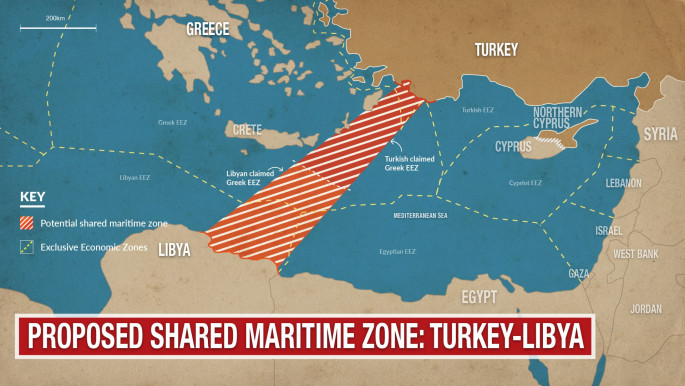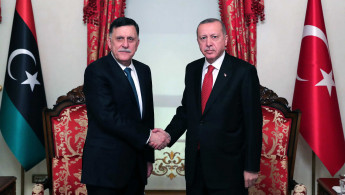Turkish parliament expected to approve controversial military pact with Libya
Turkey's parliament approved a maritime deal between the two countries earlier this month.
3 min read
Turkey is a key backer of Libya's Government of National Accord [Anadolu]
Turkey's parliament is soon expected to ratify a controversial military cooperation pact between Ankara and the internationally recognised government of Libya, paving the way for possible armed intervention in the years-long conflict.
Turkish President Recep Tayyip Erdogan and Fayez al-Sarraj, prime minister of the Tripoli-based Government of National Accord (GNA), inked the deal last month alongside a maritime border deal already approved by parliament.
The maritime accord gives Turkey access to an economic zone across the Mediterranean, brushing aside objections by Greece, Cyprus and Egypt.
Greece has since expelled the Libyan ambassador in Athens over the deal. It has also provoked anger from the European Union, which has already threatened sanctions over Turkey's oil and gas exploration in the eastern Mediterranean.
Erdogan said earlier this week that the security cooperation agreement, details of which had previously not been published, granted Turkey the right to intervene militarily in Libya.
"If Libya were to invite Turkey, of course Turkey would have the right to go to Libya as per the accord," the Turkish president said. "We are prepared to give all manner of support to Libya."
 |
| [Click to enlarge] |
Rogue General Haftar and his Libyan National Army (LNA) launched an assault on the capital in April with the aim to topple the GNA.
The military cooperation deal arrived in the Turkish parliament to be ratified on Saturday.
The agreement will open the door for exchange of personnel, materials, equipment, consultancy and experience between Turkey and Libya, state news agency Anadolu reported.
It also provides Turkish support for a so-called quick reaction force for police and military in Libya, as well as enhanced cooperation in intelligence and the defence industry.
Foreign Minister Mevlut Cavusoglu and Defence Minister Hulusi Akar met with Sarraj on the sidelines of this weekend's Doha Forum in Qatar.
Asked whether Tripoli had made a request for Turkey to send troops to Libya, Cavusoglu said "not yet" but said "sending troops is the easiest way" to stop Haftar's assault on the UN-recognised government, according to The Guardian.
Haftar's airforce has already bombed the coastal city of Misrata as a warning for Ankara not to ship in troops or further supplies.
Major General Faraj Mahdawi, Chief of Staff for Haftar's Navy, added this week that he had orders "sink any Turkish ship which enters Libya's borders".
The United Nations has accused Turkey, Jordan and the United Arab Emirates of regularly breaking an arms embargo imposed on Libya since 2011.
The three countries "routinely and sometimes blatantly supplied weapons with little effort to disguise the source," a summary of a year-long study by the UN experts said.
The UAE, a prominent Haftar backer, is also suspected of using attack aircraft on behalf of his forces.
Russia has also been accused of shipping hundreds of mercenaries to the country to fight alongside Haftar.
Follow us on Twitter and Facebook to stay connected





 Follow the Middle East's top stories in English at The New Arab on Google News
Follow the Middle East's top stories in English at The New Arab on Google News
![The UAE is widely suspected of arming the RSF militia [Getty]](/sites/default/files/styles/image_330x185/public/2024-11/GettyImages-472529908.jpg?h=69f2b9d0&itok=Yauw3YTG)
![Netanyahu furiously denounced the ICC [Getty]](/sites/default/files/styles/image_330x185/public/2024-11/GettyImages-2169352575.jpg?h=199d8c1f&itok=-vRiruf5)
![Both Hamas and the Palestinian Authority welcomed the ICC arrest warrants [Getty]](/sites/default/files/styles/image_330x185/public/2024-11/GettyImages-2178351173.jpg?h=199d8c1f&itok=TV858iVg)